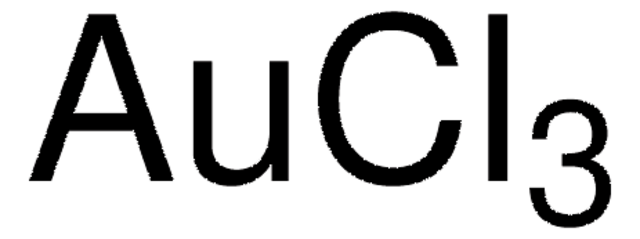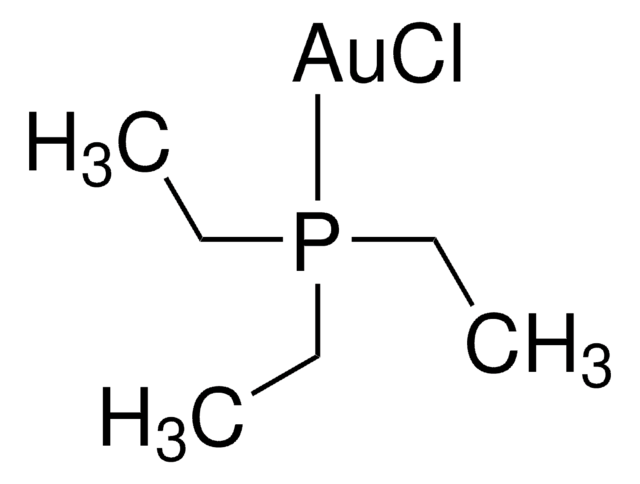481130
Gold(I)-chlorid
99.9% trace metals basis
Synonym(e):
Aurous chloride, Gold monochloride
About This Item
Empfohlene Produkte
Qualitätsniveau
Assay
99.9% trace metals basis
Form
powder
Eignung der Reaktion
reagent type: catalyst
core: gold
Verunreinigungen
≤1500 ppm Trace Metal Analysis
mp (Schmelzpunkt)
289 °C (dec.) (lit.)
Dichte
7.57 g/mL at 25 °C (lit.)
SMILES String
[Cl-].[Au+]
InChI
1S/Au.ClH/h;1H/q+1;/p-1
InChIKey
FDWREHZXQUYJFJ-UHFFFAOYSA-M
Suchen Sie nach ähnlichen Produkten? Aufrufen Leitfaden zum Produktvergleich
Verwandte Kategorien
Allgemeine Beschreibung
Anwendung
- As a precursor to prepare magnetic nanocatalyst systems for various organic transformations. For example, Fe3O4@SiO2-P–AuCl can be used as a catalyst for one-pot reductive amination of aldehydes and ketones with various aromatic amines.
- As a starting material to synthesize Au-containing complexes for application in the field of drug delivery, solar cells, sensors, and organic synthesis.
- As a precatalyst for stereoselective cycloisomerization of α-thioallenes to 2,5-dihydrothiophenes via C-S bond formation.
- As a catalyst for the conversion of siloxy cyclohexadienes, to the corresponding1,2- and 1,3-cyclohexenones via Gold-Catalyzed Cycloisomerization.
Signalwort
Danger
H-Sätze
Gefahreneinstufungen
Skin Corr. 1B - Skin Sens. 1
Lagerklassenschlüssel
8A - Combustible, corrosive hazardous materials
WGK
WGK 3
Flammpunkt (°F)
Not applicable
Flammpunkt (°C)
Not applicable
Persönliche Schutzausrüstung
Eyeshields, Faceshields, Gloves, type P3 (EN 143) respirator cartridges
Analysenzertifikate (COA)
Suchen Sie nach Analysenzertifikate (COA), indem Sie die Lot-/Chargennummer des Produkts eingeben. Lot- und Chargennummern sind auf dem Produktetikett hinter den Wörtern ‘Lot’ oder ‘Batch’ (Lot oder Charge) zu finden.
Besitzen Sie dieses Produkt bereits?
In der Dokumentenbibliothek finden Sie die Dokumentation zu den Produkten, die Sie kürzlich erworben haben.
Kunden haben sich ebenfalls angesehen
Artikel
We are proud to offer a treasure-trove of gold precatalysts and silver salts, as well as an extensive portfolio of unsaturated building blocks to accelerate your research success in this exciting field.
Plasmonic nanoparticles have unique optical properties that can be tailored to suit a variety of applications in the biotechnology1–8 and electronics9–16 industries.
Unser Team von Wissenschaftlern verfügt über Erfahrung in allen Forschungsbereichen einschließlich Life Science, Materialwissenschaften, chemischer Synthese, Chromatographie, Analytik und vielen mehr..
Setzen Sie sich mit dem technischen Dienst in Verbindung.









![[(IPr)AuCl] Umicore](/deepweb/assets/sigmaaldrich/product/structures/186/572/1f89dfca-fb52-46a2-9c9d-96db67c22883/640/1f89dfca-fb52-46a2-9c9d-96db67c22883.png)
